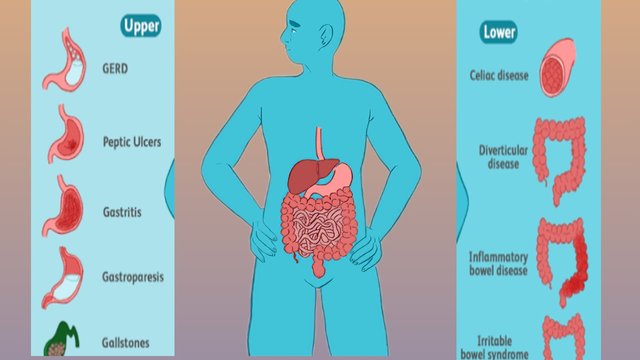DIGESTIVE SYSTEM DISODERS
- Introduction
The digestive system is responsible for breaking down food into nutrients that the body can absorb and use for energy, growth, and repair.
When any part of this system — from the mouth to the intestines — fails to function properly, it can lead to digestive disorders.
These disorders can range from mild discomfort to serious, life-threatening conditions.
- Major Functions of the Digestive System
Ingestion: Taking food into the mouth.
Digestion: Breaking down food into smaller molecules.
Absorption: Taking nutrients into the bloodstream.
Elimination: Removing undigested waste from the body.
- Common Digestive System Disorders
a. Gastroesophageal Reflux Disease (GERD)
Description: A chronic condition where stomach acid flows back into the esophagus, causing irritation.
Symptoms: Heartburn, chest pain, regurgitation, and nausea.
Causes: Weak lower esophageal sphincter, obesity, smoking, and certain foods.
Treatment: Lifestyle changes, antacids, proton pump inhibitors, or surgery.
b. Peptic Ulcers
Description: Open sores that form in the lining of the stomach, small intestine, or esophagus.
Causes: Helicobacter pylori infection or long-term use of NSAIDs (like aspirin).
Symptoms: Burning stomach pain, bloating, nausea, and loss of appetite.
Treatment: Antibiotics, acid reducers, and dietary changes.
c. Irritable Bowel Syndrome (IBS)
Description: A functional disorder affecting the large intestine without visible damage.
Symptoms: Abdominal pain, bloating, gas, diarrhea, or constipation.
Causes: Stress, diet, hormonal changes, and gut sensitivity.
Treatment: Dietary adjustments, stress management, and medications.
d. Inflammatory Bowel Disease (IBD)
Description: A group of disorders involving chronic inflammation of the digestive tract, mainly Crohn’s disease and Ulcerative colitis.
Symptoms: Severe diarrhea, abdominal pain, fatigue, and weight loss.
Treatment: Anti-inflammatory drugs, immune system suppressors, surgery (in severe cases).
e. Gallstones
Description: Hardened deposits of bile that form in the gallbladder.
Symptoms: Severe abdominal pain, nausea, vomiting, and indigestion.
Causes: High cholesterol, obesity, pregnancy, and rapid weight loss.
Treatment: Medications to dissolve stones or surgical removal of the gallbladder.
f. Celiac Disease
Description: An autoimmune disorder where the body reacts to gluten, damaging the small intestine lining.
Symptoms: Diarrhea, fatigue, anemia, and weight loss.
Treatment: Strict gluten-free diet.
g. Constipation
Description: Infrequent or difficult bowel movements.
Causes: Low fiber intake, dehydration, lack of exercise, or certain medications.
Treatment: Increased water and fiber intake, laxatives (if needed), and regular physical activity.
h. Diarrhea
Description: Frequent, loose, or watery bowel movements.
Causes: Infections, food intolerance, or medication.
Treatment: Hydration, rehydration salts, and addressing underlying cause.
- Prevention of Digestive Disorders
Eat a balanced diet rich in fiber.
Drink plenty of water.
Avoid overeating and junk food.
Exercise regularly.
Manage stress levels.
Avoid smoking and excessive alcohol.
Practice good hygiene (washing hands before eating).
